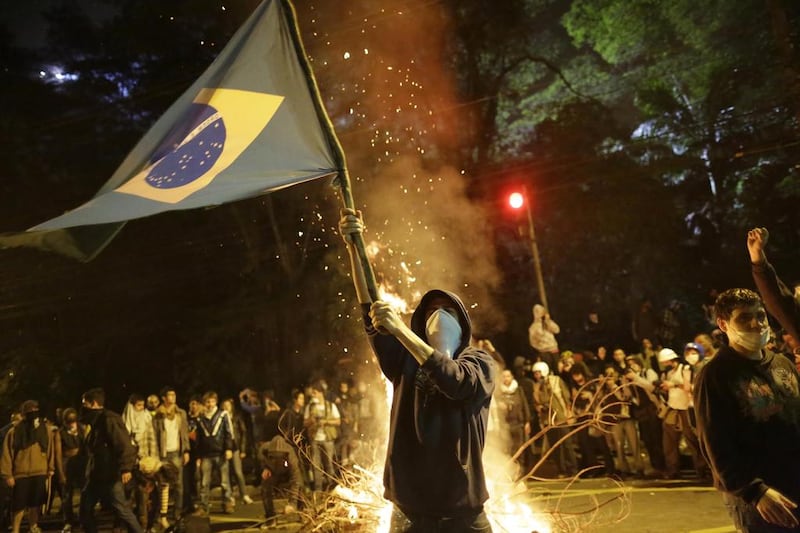More than 100 Corinthians supporters used wire cutters to break into their club’s Sao Paulo training ground on Saturday.
World champions just over a year ago, they have not been happy with the poor form of their players and sought to confront them face-to-face. They achieved their aim and one grabbed the throat of striker Paolo Guerrero, the Peruvian who had scored to make them world champions against Chelsea in Yokohama.
Police and security were called, but fans refused to leave for two hours until they had threatened several players and the coach. The Corinthians president, Mario Gobbi, said his employees were frightened to go to work.
Brazilian football crowds have long been passionate; their hooligan groups have also been violent. Incidents remain isolated, but they make headlines and Brazilians are finding headlines get things done.
When Sao Paulo state imposed a 10 per cent rise on bus fares in June 2013, it caused protests that quickly spread far away from South America’s biggest city of 20 million.
With Brazil staging the Confederations Cup – a test event for the World Cup – the protests made global news.
Initially peaceful, they found support from Brazil’s normally conformist and fast-growing middle class. Most have cars and do not ride buses, but they are unhappy at other issues from security to health, poor education, a high tax burden and poor infrastructure.
Building hugely expensive – and over budget – football stadiums for the World Cup was hardly seen as a priority either, and the protests acted as a catalyst for their frustrations. The protest movement grew, but then lost the confidence of the middle ground and started to decline when anarchist groups became more violent.
“The protests helped,” Manchester United’s Brazilian defender Rafael da Silva says. “The leaders in Brazil know that they have to change. They’ve seen the people in the streets. Before, the leaders did what they wanted. Now they have to listen if there’s a million people on the street protesting. Already there have been changes.”
Brazil’s government were shocked into making changes, with president Dilma Rousseff proposing a referendum on political reform and pledging US$25 billion (Dh91.8bn) on public transport improvements. There have been smaller protests since, leading to fears that more social unrest will mar the finals.
“If there are problems, they will be away from the stadiums,” says Diego Forlan, the Uruguayan striker who has played in Brazil for the past two years. He thinks the tournament will be a success.
“I’ve read about cities not having enough hotels and protests planned because the people know the world will be watching. But visitors will be welcomed in Brazil and it’s an incredibly varied country, socially. If I fly four hours north of here, I’ll still be in Brazil. If I fly four hours south of Manchester, I’ll be in Africa. Are the people in the Sahara the same as in Manchester? The people in the north and south of Brazil are different, too.”
But tensions remain high and the inequalities are acute. Last week, I stood by the door of Leblon Shopping as thirty private security guards vetted customers walking towards high-end designer stores. They feared protests. In Sao Paulo, outside an upscale Iguatemi mall, protesters carried a banner stating, in English: “In the World Cup country, malls forbid entrance of black and poor people.”
There is no such policy, but the perception among the protesters is that one exists.
Another protest in Sao Paulo on January 25 saw 2,500 people complain about the costs of staging the World Cup. They marched through the streets chanting: “There will be no cup.”
“We feel cheated,” said Eloy Roberto, a retired printer from Rio Grande do Sul. “We don’t trust the government. We’re paying first-world taxes for third-world levels of service and an infrastructure which will be embarrassing when the rest of the world looks at it during the World Cup finals.”
Yet, the majority of Brazilians are looking forward to the World Cup finals.
“The Brazilian people want the World Cup to be a success,” says Pedro Wilson Silveira, 39, a Rio businessman. “The Brazilian people will give passion and they love football, but the competition also gives protesters a chance to be heard by the world in an election year. Protests are probable and I can understand the frustrations.
“Of course we should have a better health and education system, but these aren’t anything to do with staging the World Cup.
“There are many reasons that are nothing to do with a football competition or the Olympic Games in Rio.”
He foresees only benefits.
“The World Cup will raise Brazil’s profile. Tourists will be more interested in visiting cities like Rio, a special place which should have a global profile like London or New York. I can’t wait,” he says.
sports@thenational.ae






